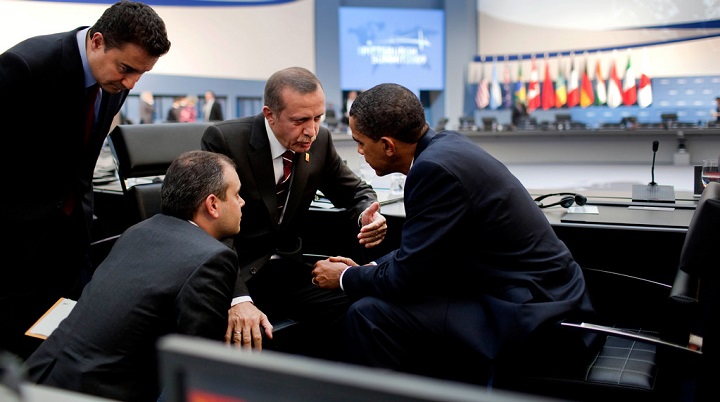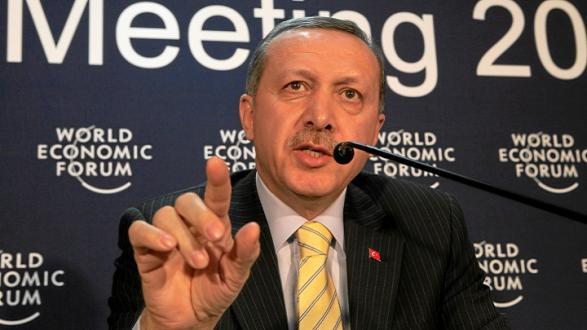From its porous borders with Syria and Iraq to domestic crackdowns on democratic rights and freedoms, President Recep Tayyip Erdoğan's Turkey is in a precarious state.
David Judson, Editor-in-Chief of the global intelligence company Stratfor, lived and worked in Istanbul for eight years as as the Editor-in-Chief of Hurriyet Daily News, Turkey's oldest English-language daily. He is an expert on democracy and media freedoms in Turkey.
As part of our Edgerton Series on Iran and Turkey, I sat down with Mr. Judson to discuss the current state of Turkey under the reign of Erdoğan. Having recently returned from the Turkey-Syria border, he offered special insight on the passageway for incoming Syrian refugees and foreign fighters seeking to join the Islamic State in Kobani.
The following has been edited and condensed for clarity and length.
____________________
Kaveh Farzad: You spent the day at Pomona College speaking to foreign policy students. Can you describe the topics that you covered, and the conversations that ensued?
David Judson: Basically, what we spoke about was that the Arab Spring as popularly conceived - as being sort of a volcano of democratic discontent that exploded against regimes, and thus was expected to usher a wave of democratic change - never happened. There was never an Arab Spring. It was a media construct.
Almost any analysis-debate about the media, from the left or from the right, turns into a debate on the stories journalists are working on. Why are they not working on this? Why is Israel’s election on page one but Nigeria’s election on page sixteen? Why are journalists working on Hillary’s emails and not working on Ted Cruz’s taxes? A more interesting way to think about the media is the stories that journalists are working from. What are the metanarratives? What are the derivatives?
There was never an Arab Spring. It was a media construct.
The metaphor on which the Western media approached these waves of protests was derivative of the Color Revolutions of Eastern Europe. This was the Prague Spring. And so there’s a phenomenological tendency to ascribe qualities to events that don’t really square with reality. So, if the media got it wrong, then what is the explanation for these events that didn’t have a happy ending? We talked about the long war of 1914-1989 that sort of threw a wet blanket over this mosaic of countries whose boundaries were arbitrarily drawn without regard to demographics, population, or political realities – the Sykes–Picot Agreement, for example. As the lid was lifted after nearly a century, those pre-1914 political realties suddenly boiled forth, and this is now what we’re left with. This is partly because the Americans retreated after the Jihadi wars. And so there was this political vacuum, the world rushed in, and this is the turmoil we are left with.
KF: With the turmoil ultimately being the consequence of a divide-and-rule system in the Middle East.
Judson: Right, yes. It’s fairly abstract, but the young people really responded well to that and asked a lot of interesting and challenging questions about sectarian strife, where the world is headed, authoritarianism, and the trajectory of authoritarianism around the world. It was a really interesting kind of a roundtable discussion.
KF: Experts estimate that so far nearly 20,000 foreigners, including about 3,400 Westerners, have joined the Islamic State in Iraq and Syria. The majority of them have traveled through Turkey. Many Western officials argue that Turkey itself – which does not see the Islamic State as a primary enemy – is at least partly to blame for this. Director of U.S. National Intelligence James Clapper was quoted saying that when it comes to securing its border, Turkey “seems to have other priorities and other interests.” Is the ambivalence amongst Turkish officials to blame for the country’s porous border dilemma?
Judson: I don’t know if you can put the whole emergence of the Islamic State on Turkish shoulders. Turkey has been at odds with and a reluctant partner of the West. Part of the border issue is just that it’s a very long border. The second thing, of course, is that one hears endless stories that are impossible to confirm about trucks without customs papers moving on the border with cargos of ammunition coming in from the Atatürk airport. Separating fact from fiction in Turkey is always difficult. For the Erdoğan government, Assad – and the Assad regime – is just shy of being an obsession. And, to state it crudely, “the enemy of my enemy is my friend.” Those rebels fighting Assad have been given a wink and nod. Just to make it clear, Turkey winks and nods at the rebels. Increasingly, of course, the West is winking and nodding at Assad. And this is the basic source of tension with the AKP government.
For the Erdogan government, Assad – and the Assad regime – is just shy of being an obsession. And, to state it crudely, “the enemy of my enemy is my friend.”
Turkey has, along with Qatar, always been much more comfortable supporting a lot of groups that didn’t pass the vetting for the overt and covert aid that the United States has been giving in Syria. Even before the Islamic State, there was aid from Turkey getting to people that were not on the A-list of the United States, NATO, and the West. Now, as those groups have morphed into the Islamic State, the Turks are finally getting serious about securing the border. But the genie is out of the bottle.
KF: Since 2012, Erdoğan’s government has imprisoned more journalists than any other country in the world. Reporters without Borders ranks Turkey 154th on their Press Freedom Index list, behind countries like Iraq and Russia. Having been the head of a newspaper in Turkey largely seen as a critical of the government, could you remark on your personal experience as a journalist in Turkey, and perhaps offer your take on the current state of press freedom in Turkey?
Judson: I was running a very small newspaper that was printed in a language that 99% of the population of the country didn’t speak, so we had more latitude than a lot of people because the government didn’t really notice. We could draw blood in Brussels and we could draw blood in Washington as a paper that was read and followed by the diplomatic and commercial elite. Still, we would get pressure.
Back in 2006, Erdoğan called for a boycott of Doğan newspapers because we were reporting on a case that was in the German courts. We were hit by a $2.5 billion dollar tax case. It was a contrived case that resulted in Doğan having to remove all of the Editors-in-Chief of every one of the seven newspapers. I never felt directly, you know, “do not print this,” or “censor that story,” but the waves of pressure on the media ultimately had a lot to do with my departure from the Turkish media scene.
KF: Erdoğan said last month that he was contemplating shutting down access to social media in the run-up to the election. Where do you see it going from here?
Judson: I think it could get worse. Stories of the abuse of press freedoms are almost a daily occurrence. Nevertheless, there are a lot of bold journalists soldiering on. It’s not that these newspapers are shut down, but their advertising revenues are constrained, their distribution mechanisms are constrained, and there’s not much left in television that isn’t part of the Erdoğan controlled system. You hear interesting stories, anecdotally, that precinct captains for the AKP in various cities and regions will go to coffee houses and make it clear that the television station is to remain tuned to a pro-AKP channel. It’s about who in the media gets access to the government or gets on the president's plane, which is a game American politicians play.
The good news is that it’s a young population that’s very deft with technology. If you shut a website down here, they will use proxy servers to set up one over there. Controlling media freedom in today’s world is not really possible.
KF: The UNHCR anticipates that the number of refugees and asylum seekers in Turkey in 2015 is expected to rise to nearly 1.9 million, including nearly 1.7 million Syrian refugees. Some of these refugees are reportedly living in camps constructed by the government in Ankara; others are living in private accommodations. Having recently traveled to the border, could you expand on the country’s refugee situation?
Judson: I didn’t visit any of the camps, but Turkey is a country that is in some ways settled by refugees. One could look at the Balkan wars, for example: there are more Bosnians in Turkey than in Bosnia and more Albanians in Turkey than probably in Albania. Atatürk was a refugee. When he founded the Republic, the city he was born in was no longer Turkey. Can you imagine two million refugees in Germany or France? People mumble and gripe that it strains the system, and while there is a lot of tension, you don’t see a great call to expel the refugees. Yes, the health system is overtaxed and the education system is costing Turkey a lot of money, but under the circumstances I think Turkey is doing pretty well.
The amazing thing to me is how well Turkey is doing with these refugees, rather than how badly they are doing.
I think there’s something almost elegant about just sort of giving refugees a work permit and a canteen and wishing them luck. It’s a polyglot culture that has a super-identity of Turkish-ness, with the Kurds being the one group that has resisted assimilation into that. The amazing thing to me is how well Turkey is doing with these refugees, rather than how badly they are doing.
KF: It’s been argued that since there is no one to counsel Erdoğan, Turkish foreign policy is a function only of what is good for Erdoğan politically. One example is his unyielding position that Assad “must go” by “any means necessary.” What effect do you believe Erdoğan’s foreign policy has had on Turkey’s relationship with its NATO allies, primarily the United States?
Judson: I think [the relationship] is tense. Turkey wants to buy a missile defense system, and they’ve been going back and forth between looking at American companies and taking bids from Chinese companies. When they looked as though they were finally going to buy from the Chinese, they pulled back and said that the decision wouldn’t be made until after the election.

Our long-term forecast at Stratfor is that Turkey will come into increasing conflict with the United States, particularly as its Navy grows in the Eastern Mediterranean. The alignment between Turkey’s interests and NATO’s will also become increasingly strained.
____________________
David D. Judson is Stratfor’s editor-in-chief. He oversees both the global network of the company’s information gathering area specialists as well as the publishing team in Austin that works with analysts to craft Stratfor’s work into written, video and graphic form. Before joining Stratfor, Judson worked for the Istanbul-based Dogan Media Group for eight years, first as managing editor of the Turkish-language business daily Referans and later as editor-in-chief of the Hurriyet Daily News, the company’s English paper. Before his work internationally, Judson was a senior correspondent in Washington for Gannett Newspapers/USA Today.
Kaveh Farzad is the Communications Officer at the Pacific Council on International Policy.




